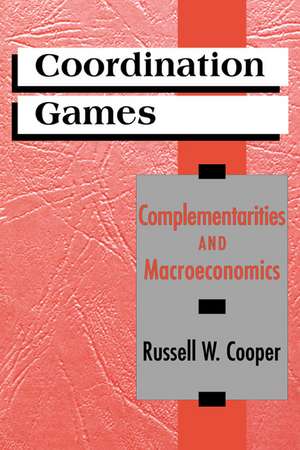Coordination Games
Autor Russell Cooperen Limba Engleză Paperback – 27 feb 1999
| Toate formatele și edițiile | Preț | Express |
|---|---|---|
| Paperback (1) | 317.02 lei 6-8 săpt. | |
| Cambridge University Press – 27 feb 1999 | 317.02 lei 6-8 săpt. | |
| Hardback (1) | 516.88 lei 6-8 săpt. | |
| Cambridge University Press – 27 feb 1999 | 516.88 lei 6-8 săpt. |
Preț: 317.02 lei
Nou
Puncte Express: 476
Preț estimativ în valută:
60.67€ • 63.11$ • 50.09£
60.67€ • 63.11$ • 50.09£
Carte tipărită la comandă
Livrare economică 14-28 aprilie
Preluare comenzi: 021 569.72.76
Specificații
ISBN-13: 9780521578967
ISBN-10: 0521578965
Pagini: 180
Ilustrații: 14 b/w illus.
Dimensiuni: 152 x 229 x 11 mm
Greutate: 0.25 kg
Ediția:New.
Editura: Cambridge University Press
Colecția Cambridge University Press
Locul publicării:New York, United States
ISBN-10: 0521578965
Pagini: 180
Ilustrații: 14 b/w illus.
Dimensiuni: 152 x 229 x 11 mm
Greutate: 0.25 kg
Ediția:New.
Editura: Cambridge University Press
Colecția Cambridge University Press
Locul publicării:New York, United States
Cuprins
Introduction; 1. Experimental evidence and selection; 2. A framework for analysis; 3. Technological complementarities; 4. Imperfect competition and demand spillovers; 5. Thick markets: search and matching; 6. Timing of discrete choices; 7. Government policy; 8. Concluding thoughts; References; Endnotes.
Recenzii
"The field of macroeconomic complementarities investigates how and why real-world economies sometimes appear to 'overreact' to small external and internal shocks. Russ Cooper's new book is a readable and scientifically honest summary of recent research, by himself and others, on the strategic foundations of these complementarities. The book seems to me ideally suited for graduate courses in macroeconomics, and for all those who want a deeper understanding of what triggers economic 'overreactions'." Costas Azariadis, UCLA
"Cooper's book gives a lucid, insightful and panoramic exposition of coordination games and their macroeconomic applications. It is an excellent book not only to learn about the subject, but also as a reference for the expert." Jess Benhabib, New York University
"Russell Cooper is one of the leading exponents of the role of 'complementarity' in macroeconomics, so it is no surprise that he has written an outstanding book on the subject. What is amazing is how much he has managed to cram into this elegant, small volume. It is a lucid introduction to the literature as well as a report from the trenches. It will serve the graduate student as a text and the researcher as a handy guide. It contains material on experimental and empirical research as well as theory. And throughout it is focused on macroeconomic issues. Anyone interested in frontier research in macroeconomics will want to have a copy of this book." Douglas Gale, New York University
"Finally, serious economic theory to tell us what Keynes really meant. Must reading for the modern macroeconomist." Robert Hall, Stanford University
"The book is an excellent broad survey of the macroeconomic coordination game literature. Indeed, it is amazing how much material it covers in this literature, while maintaining cohesiveness. Cooper has done the profession a great service in writing this book." John Bryant, Journal of Economic Literature
"Cooper's book gives a lucid, insightful and panoramic exposition of coordination games and their macroeconomic applications. It is an excellent book not only to learn about the subject, but also as a reference for the expert." Jess Benhabib, New York University
"Russell Cooper is one of the leading exponents of the role of 'complementarity' in macroeconomics, so it is no surprise that he has written an outstanding book on the subject. What is amazing is how much he has managed to cram into this elegant, small volume. It is a lucid introduction to the literature as well as a report from the trenches. It will serve the graduate student as a text and the researcher as a handy guide. It contains material on experimental and empirical research as well as theory. And throughout it is focused on macroeconomic issues. Anyone interested in frontier research in macroeconomics will want to have a copy of this book." Douglas Gale, New York University
"Finally, serious economic theory to tell us what Keynes really meant. Must reading for the modern macroeconomist." Robert Hall, Stanford University
"The book is an excellent broad survey of the macroeconomic coordination game literature. Indeed, it is amazing how much material it covers in this literature, while maintaining cohesiveness. Cooper has done the profession a great service in writing this book." John Bryant, Journal of Economic Literature
Descriere
This 1999 book covers a branch of macroeconomics in which inefficiencies arise from the interaction of agents.
















